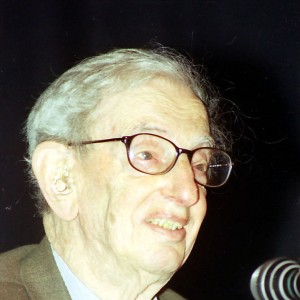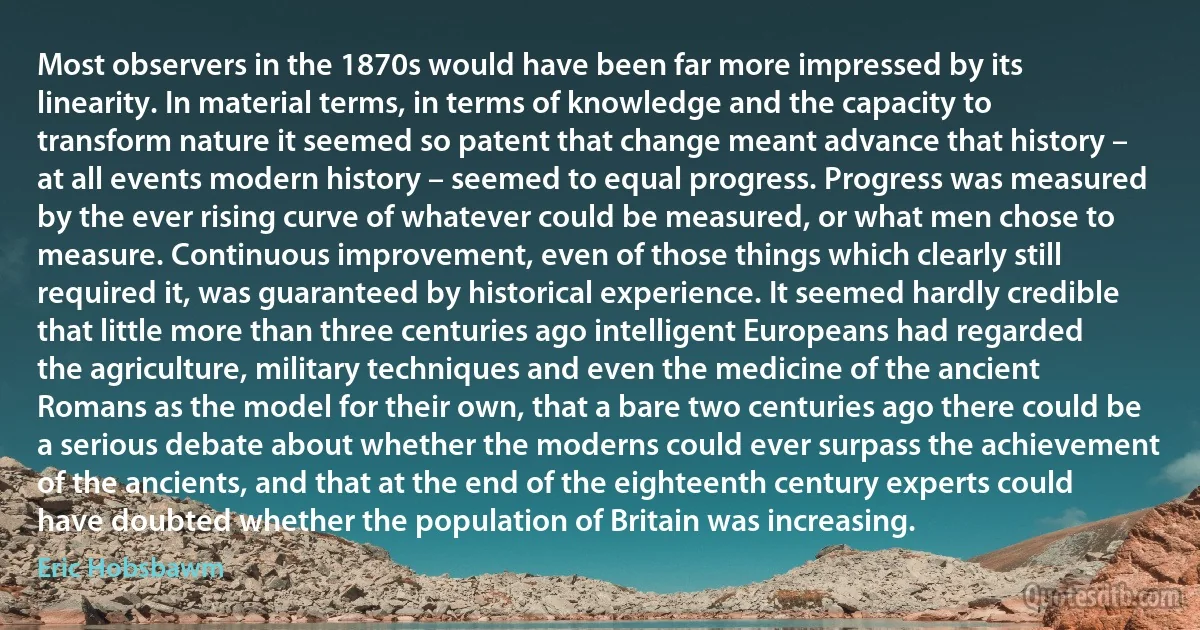Eric Hobsbawm quotes - page 3
The point about social bandits is that they are peasant outlaws whom the lord and state regard as criminals, but who remain within peasant society, and are considered by their people as heroes, as champions, avengers, fighters for justice, perhaps even leaders of liberation, and in any case as men to be admired, helped and supported.

Eric Hobsbawm
It is not strictly accurate to call the ‘enlightenment' a middle class ideology, though there were many enlighteners-and politically they were the decisive ones-who assumed as a matter of course that the free society would be a capitalist society. In theory its object was to set all human beings free. All progressive, rationalist and humanist ideologies are implicit in it, and indeed came out of it. Yet in practice the leaders of the emancipation for which the enlightenment called were likely to be the middle ranks of society, the new, rational men of ability and merit rather than birth, and the social order which would emerge from their activities would be a ‘bourgeois' and capitalist one.

Eric Hobsbawm
The alternative to escape or defeat was rebellion. And such was the situation of the labouring poor, and especially the industrial proletariat which became their nucleus, that rebellion was not merely possible, but virtually compulsory. Nothing was more inevitable in the first half of the nineteenth century than the appearance of labour and socialist movements, and indeed of mass social revolutionary unrest.

Eric Hobsbawm
To draw a parallelism between the arts and the sciences is always dangerous, for the relationships between either and the society in which they flourish is quite different. Yet the sciences too in their way reflected the dual revolution, partly because it made specific new demands on them, partly because it opened new possibilities for them and faced them with new problems, partly because its very existence suggested new patterns of thought.

Eric Hobsbawm
Above all, history – social and economic structure – and politics divided the revolutionary zone into two parts, whose extremes appeared to have little in common. Their social structure differed fundamentally, except for the substantial and pretty universal prevalence of countrymen over townsmen, of small towns over big cities; a fact easily overlooked, because the urban population and especially the large cities were disproportionately prominent in politics.

Eric Hobsbawm
We are today more familiar than the men of the mid-nineteenth century with this drawing together of all parts of the globe into a single world. Yet there is a substantial difference between the process as we experience it today and that in the period of this book. What is most striking about it in the later twentieth century is an international standardization which goes far beyond the purely economic and technological. In this respect our world is more massively standardized than Phileas Fogg's, but only because there are more machines, productive installations and businesses.

Eric Hobsbawm
As capitalism and bourgeois society triumphed, the prospects of alternatives to it receded, in spite of the emergence of popular politics and labour movements. These prospects could hardly have seemed less promising in, say 1872–3. And yet within a very few years the future of the society that had triumphed so spectacularly once again seemed uncertain and obscure, and movements to replace it or to overthrow it had once again to be taken seriously. We must therefore consider these movements for radical social and political change as they existed in the third quarter of the nineteenth century.

Eric Hobsbawm
It is easier to formulate questions than answers, and this paper has taken the easier way rather than the more difficult. And yet, perhaps to ask questions, especially about the experiences we tend to take for granted, is not a valueless occupation. We swim in the past as fish do in water, and cannot escape from it. But our modes of living and moving in this medium require analysis and discussion. My object has been to stimulate both.

Eric Hobsbawm
So let me conclude. History has made progress this century, in a lumbering and zig-zag manner, but genuine progress. In saying this I am implying that it belongs to the disciplines to which the word 'progress' can properly apply, that it is possible to arrive at a better understanding of a process which is objective and real, namely the complex, contradictory, but not adventitious, historical development of human societies in the world. I know that there are people who deny this.

Eric Hobsbawm
My argument implies that, divorced from history, economics is a rudderless ship and economists without history have not much idea of where it is sailing to. But I am not suggesting that these defects can be remedied simply be getting some charts, that is by paying more attention to concrete economic realities and historical experience. As a matter of fact, there have always been plenty of economists ready and anxious to keep their eyes open. The trouble is that, if in the mainstream tradition, their theory and method as such has not helped them to know where to look and what to look for.

Eric Hobsbawm
From the historians' point of view these assumptions must be realistic or they are junk. If we use the assumption of perfect foresight by businessmen to construct data, the question of its empirical validity is crucial. Altering the assumptions, whether about the model or about the data, can make a substantial difference to both the data and the answers.

Eric Hobsbawm
It is in this situation that political partisanship can serve to counteract the increasing tendency to look inwards, in extreme instances the scholiasm, the tendency to develop intellectual ingenuity for its own sake, the self-insulation of the academy. It may indeed fall victim to the same dangers itself, if a sufficiently large 'field' of a self-insulated partisan scholarship develops.

Eric Hobsbawm
The major strength of Wolf's book - his concentration on interaction, intermingling and mutual modification - is at the same time its major weakness, since it tends to take for granted the nature of the dynamism which has brought the world from pre-history to the late twentieth century. This is a book about connections rather than causes. Or rather, the author has re-thought the problems of the genesis and development of capitalism less fundamentally than those of the interconnections essential to it.

Eric Hobsbawm
Clearly some historians have shifted from 'circumstances' to 'men' (including women), or have discovered that a simple base-superstructure model and economic history are not enough, or - since the pay-off from such approaches has been very substantial - are no longer enough. Some may well have convinced themselves that there is an incompatibility between their 'scientific' and 'literary' functions. But it is not necessary to analyse the present fashions in history entirely as a rejection of the past, and insofar as they cannot be entirely analysed in such terms, it will not do.

Eric Hobsbawm
Marx's ideas became the doctrines inspiring the labour and socialist movements of most of Europe. Mainly via Lenin and the Russian Revolution they became the quintessential international doctrine of twentieth-century social revolution, equally welcomes as such from China to Peru. Through the triumph of parties identified with these doctrines, versions of these ideas became the official ideology of the states in which, at their peak, something like a third of the human race lived, not to mention political movements of varying size an importance in the rest of the world. The only individually identifiable thinkers who have achieved comparable status are the founders of the great religions in the past, and with the possible exception of Muhammad none have triumphed on a comparable scale with such rapidity. No secular thinker can be named beside him in this respect.

Eric Hobsbawm
Eric Hobsbawm

Photo:
Government of India,
GODL-India
Occupation: British Academic
Born: June 9, 1917
Died: October 1, 2012
Quotes count: 69
Wikipedia: Eric Hobsbawm










